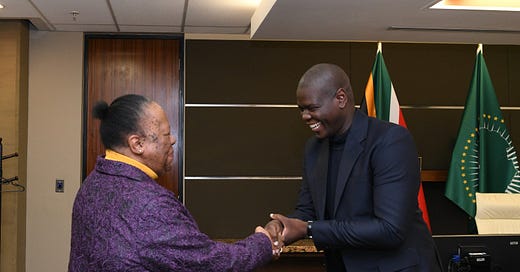South Africa Navigates Foreign Policy Challenges Amid New Coalition Government
South Africa's new coalition government faces foreign policy challenges as it balances ANC's non-aligned stance with partners' divergent views. Can unity prevail on the global stage?
Following its May 2024 elections, South Africa has entered a new era of coalition politics that could potentially impact its long-standing foreign policy positions. The African National Congress (ANC), led by President Cyril Ramaphosa, secured 40.18% of the vote, necessitating the formation of a Government of National Unity (GNU) with ten other parties.
The new cabinet, announced in early July, comprises 32 positions, with the ANC holding 20 portfolios including key ministries such as finance, justice, and defense. Despite winning less than half the popular vote, the ANC controls 62.5% of ministerial posts. The main opposition Democratic Alliance (DA), which secured 21.81% of votes, holds six cabinet seats.
Political analysts note that this disproportionate distribution of power within the GNU could lead to tensions. The ANC's strategy appears to be maintaining control over critical policy areas, particularly foreign affairs while making concessions in less sensitive portfolios. This approach may help preserve policy continuity but could also strain coalition relationships if smaller parties feel marginalized in decision-making processes.
President Ramaphosa has appointed 40-year-old Ronald Lamola as Minister of International Relations and Cooperation, replacing the experienced Naledi Pandor. Lamola's appointment, supported by two ANC deputy ministers, signals Ramaphosa's intent to maintain policy continuity in international affairs.
The choice of a younger, rising ANC star for this crucial role may be seen as a strategic move to inject fresh energy into South Africa's diplomatic efforts while ensuring loyalty to the party's established foreign policy principles. However, Lamola's relative inexperience in international relations could be tested in complex global situations.
In his inaugural speech, Lamola reaffirmed South Africa's commitment to a foreign policy guided by human rights, constitutional principles, and active non-alignment. This stance aligns with the ANC's preference for a just, peaceful, and equitable world order, potentially clashing with some coalition partners' pro-Western views.
The potential for foreign policy disagreements within the GNU presents a significant challenge. Parties like the DA and Freedom Front Plus have historically advocated for closer alignment with Western powers, contrasting with the ANC's non-aligned stance. Managing these divergent viewpoints while presenting a unified front on the international stage will require delicate political maneuvering.
A key test for the new government will be its handling of the ongoing case against Israel at the International Court of Justice (ICJ). South Africa has accused Israel of genocide in Gaza, a position Lamola vigorously defended as Justice Minister during the January 2024 ICJ hearings. On July 19, the ICJ issued an advisory opinion affirming its jurisdiction and declaring Israel's continued presence in Occupied Palestinian Territory unlawful under international law.
This case exemplifies South Africa's willingness to take bold stances on international issues, often putting it at odds with Western powers. The GNU's ability to maintain this approach in the face of potential internal disagreements and external pressures will be closely watched by the international community.
Regarding the Russia-Ukraine conflict, Lamola has emphasized the role of non-aligned countries as mediators. He highlighted the impact of the war on Africa, particularly in terms of increased food and energy prices. South Africa previously led an African Peace Initiative to both Ukraine and Russia, proposing a ten-point plan for de-escalation and negotiations.
The Chinese Foreign Ministry recently announced that South Africa has endorsed a China-Brazil proposed roadmap for resolving the Ukraine conflict. This six-point plan, which has reportedly received positive responses from over 110 countries, calls for principles including no expansion of the battlefield and diplomacy as the sole means of settlement.
South Africa's support for this initiative underscores its commitment to Global South cooperation and its neutral stance in the conflict, despite Western pressure to condemn Russia. As a member of the BRICS bloc, South Africa continues to navigate a delicate balance in its international relations.
This balancing act between maintaining relationships with BRICS partners and managing Western expectations could become more challenging under the GNU. Coalition partners may push for a recalibration of South Africa's stance on issues like the Ukraine conflict, potentially leading to internal policy debates and external perception shifts.
Political analyst Professor John Molepo from North-West University suggests that despite the coalition government, significant changes to South Africa's foreign policy stance are unlikely. The ANC's control of key ministries and the requirement for a parliamentary majority to alter existing policies provide a buffer against drastic shifts.
However, the long-term sustainability of this approach remains uncertain. As smaller parties gain experience in government and potentially grow their electoral support, they may demand greater influence over foreign policy decisions. This could lead to a gradual evolution of South Africa's international positioning over time.
As South Africa adapts to its new political landscape, maintaining a coherent international relations policy will be crucial. The country's non-aligned position and its role in mediating global conflicts may face scrutiny from coalition partners with divergent views. However, the ANC's dominance in foreign affairs portfolios suggests a continuation of its established diplomatic approach, emphasizing Global South solidarity and peaceful conflict resolution.
The success of this coalition experiment in foreign policy management could have far-reaching implications, not only for South Africa's global standing but also for the future of coalition politics in the country. It may set a precedent for how diverse political interests can be balanced in shaping a nation's international engagement, offering valuable lessons for other emerging democracies grappling with coalition dynamics in an increasingly complex global order.







